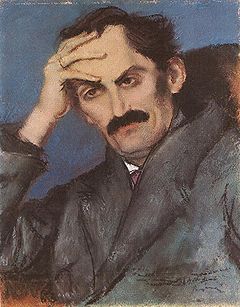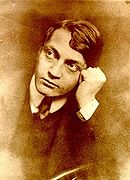- Mihály Babits
-
See also: BabicsThe native form of this personal name is Babits Mihály. This article uses the Western name order.
Babits Mihály 
Born November 26, 1883
SzekszárdDied August 4, 1941 (aged 57)
BudapestNationality Hungarian Period 1900–1941 Genres Poetry, Short stories, Novels
Literary history
Essays, lyric poetrySpouse(s) Ilona Tanner (pen name: Sophie Török) Relative(s) Mother: Auróra Kelemen
Father: Mihály Babits
Influences- László Négyesy (Writing style)
InfluencedMihály Babits (pronounced: Mihaai Babich) (November 26, 1883, Szekszárd – August 4, 1941) was a Hungarian poet, writer and translator.
Biography
Babits was born in Szekszárd. He studied at the University of Budapest from 1901 to 1905, where he met Dezső Kosztolányi and Gyula Juhász. He worked to become a teacher and taught at schools in Baja (1905 – 1906), Szeged (1906–1908), Fogaras (1908 – 1911), Újpest (1911), and Budapest (1912 – 1918).
His reputation for his poems in the literary life started in 1908.
He made a trip to Italy in the same year, which made him interested in Dante; he made several other trips in later years. This experience led him to translate Dante's Divine Comedy (Hell, 1913, Purgatory, 1920, and Paradise, 1923).
Briefly after the Hungarian Revolution of 1919 he became a Professor of Foreign Literature and modern Hungarian literature at Eötvös Loránd University, but was soon removed for his pacifism after the revolutionary government fell.
In 1911, he became a staff writer on the magazine Nyugat.
In 1921 married Ilona Tanner, who later published poetry under the name Sophie Török. Two years later he moved to Esztergom. In 1927 he became a member of the Kisfaludy Társaság (Kisfaludy Society) and in the same year he was made a trustee of the Baumgarten Prize.
He became the editor-in-chief of Nyugat in 1929 (sharing the role until 1933 with Zsigmond Móricz), a position he held until his death.
In 1937, he was diagnosed as having laryngeal cancer. He died in Budapest in 1941.
Work
Babits is best known for his lyric poetry, influenced by classical and English forms. He also wrote essays and translated much from English, French, German, Greek, Italian, and Latin.
External links
This biography of a member of a noble house or article about nobility is a stub. You can help Wikipedia by expanding it.

